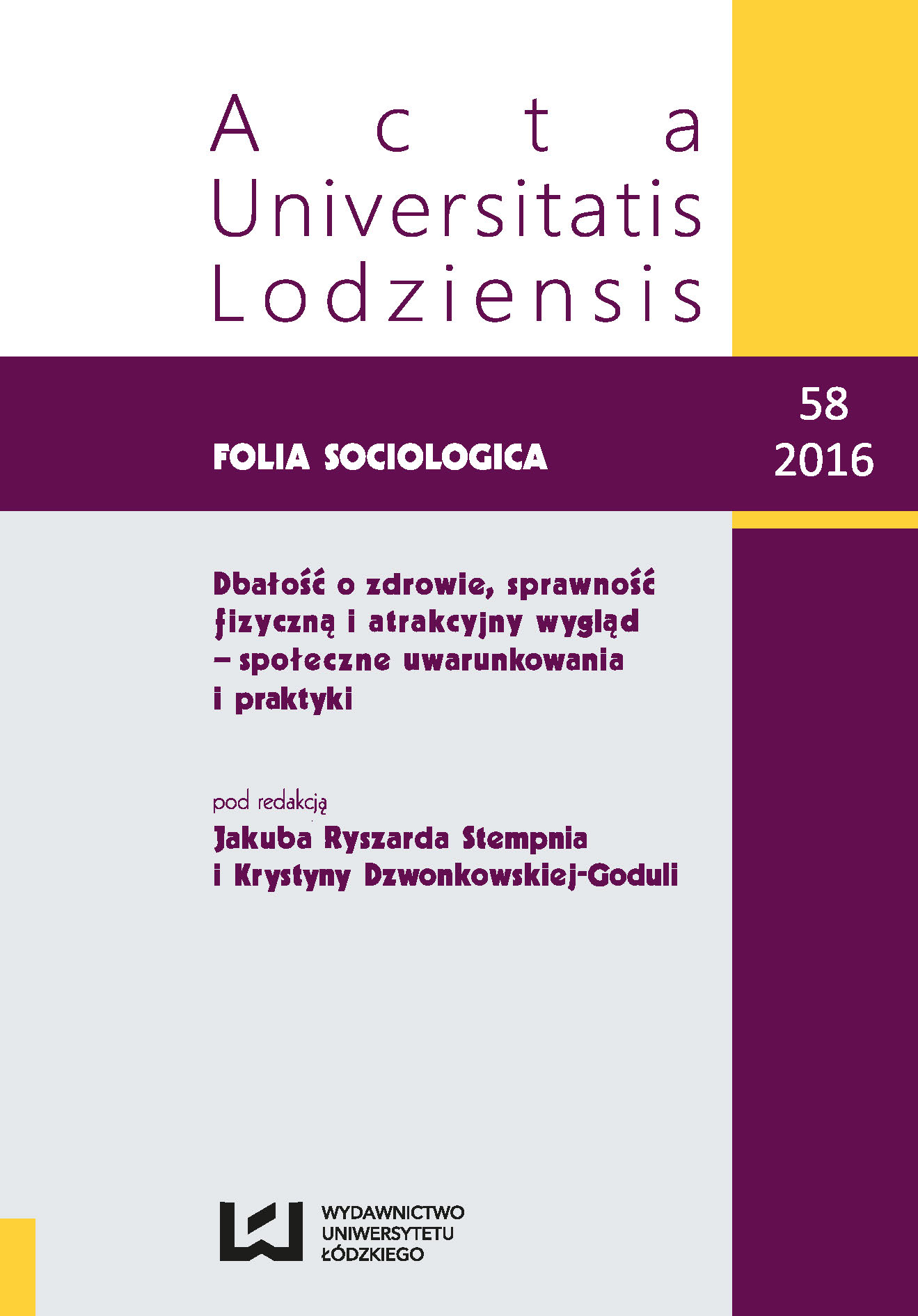Television, sweets, and health. On children’s agency and tensions in everyday life practices in the context of health promoting programmes
DOI:
https://doi.org/10.18778/0208-600X.58.07Keywords:
health, children, childhood studiesAbstract
In this text I present the results of research conducted as part of the project “Health in the opinions of children – childhood studies perspective” conducted by the Interdisciplinary Team for Childhood Studies at the University of Warsaw. The main goal of the project is to uncover the meanings young children (between 8 and 11 years of age) attribute to health, or the lack of it. I show how children, as social actors, cope with the modern demands regarding the body and their own new position as being responsible for passing knowledge about good eating habits and healthy lifestyles. I also present children’s definitions of health and their understanding of unhealthy behaviour. One of the main subject of children’s stories, next to the rather obvious associating health with sports, and eating fruits and vegetables, turned out to be the TV set, computer and other electronic devices. There-fore I ask about the meaning children give to media in the context of health. I focus on how they connect them to health, and on what linking the practice of TV watching with the subject of health tells us about the concepts of health and body. I also show how including television, computers and tablets in the health discourse is a result of a non-dualistic understanding of the body by children. For children health is inextricably linked to morality, education, and aesthetics. Even though the interviewed children adopt many of the narrations on health distributed by the educational institutions, and they seem to know how to eat and live healthy, they create health narrations of their own and on their own grounds. On one hand they are submissive receivers of the health promoting programmes (they know what is healthy), but on the other hand they stay members of their children’s tribe, who realize their childhood by practicing what is considered unhealthy and “non-adult”. The research gives us a picture of a divided child. A child that knows what to do to be healthy, but at the same time doing “unhealthy” things, which is allowed by the status of being a child.
References
Ash J. (2013), New media and participatory cultures, [w:] S. Bragg, J.M. Kehily (red.), Children and young people’s cultural worlds, The Policy Press, Bristol, s. 219–267.
Google Scholar
DOI: https://doi.org/10.2307/j.ctt1t896z3.10
Beck U. (2012), Społeczeństwo światowego ryzyka, Wydawnictwo Naukowe Scholar, Warszawa.
Google Scholar
Bragg S., Kehily J. M. (red.) (2013), Children and young people’s cultural worlds, The Policy Press, Bristol.
Google Scholar
DOI: https://doi.org/10.2307/j.ctt1t896z3
Buckingham D. (2008), Nowe media – nowe postaci dzieciństwa? Zmieniające się środowisko kulturowe dzieci w erze technologii cyfrowej, [w:] M.J. Kehily (red.), Wprowadzenie do badań nad dzieciństwem, Wydawnictwo WAM, Kraków, s. 151–169.
Google Scholar
Buliński T. (2002), Człowiek do zrobienia. Jak kultura tworzy człowieka: Studium antropologiczne, Wydawnictwo Poznańskie, Poznań.
Google Scholar
Christensen J., James A. (red.) (2008), Research witch children: Perspectives and practices, Routledge, Abington−New York.
Google Scholar
DOI: https://doi.org/10.4324/9780203964576
Clark C.D. (2011), In A Younger Voice. Doing Child-Centered Qualitative Research, Oxford University Press, Oxford−New York.
Google Scholar
Diasio N. (2010), Children and Food: Ambivalent Connections Between Risk, Moral Technologies, and Fun, [w:] S. Vandamm , S. van de Vathorst (red.), Whose Weight is it Anyway?: Essays on Ethics and Eating, Acco, Leuven−Den Haag, s. 55–66.
Google Scholar
Dworkin R. (2000), The New Gospel of health, “The Public Interest”, Vol. 141, s. 77–90.
Google Scholar
Foucault M. (1995), Historia seksualności, Czytelnik, Warszawa.
Google Scholar
Giddens A. (2002), Nowoczesność i tożsamość. „Ja” i społeczeństwo w epoce późnej nowoczesności, Wydawnictwo Naukowe PWN, Warszawa.
Google Scholar
Jacyno M., Szulżycka A. (1999), Dzieciństwo: doświadczenie bez świata, Oficyna Naukowa, Warszawa.
Google Scholar
James A., James A.L. (2008), Key concepts in childhood studies, Sage, Los Angeles.
Google Scholar
Kapuścińska A. (2011), Edukacja zdrowotna w podstawie programowej dla klas I–III, [w:] B. Woynarowska (red.), Organizacja i realizacja edukacji zdrowotnej w szkole. Poradnik dla dyrektorów szkół i nauczycieli, Ośrodek Rozwoju Edukacji, Warszawa, s. 79–89.
Google Scholar
Landau-Czajka A. (2003), Zagrożenia i niebezpieczeństwa „nowomodnych rozrywek”. Co grozi dzieciom ze strony książek, teatry, filmu, telewizji, wideo, gier komputerowych i wszystkiego, co uda się jeszcze wynaleźć?, [w:] M. Dąbrowska, A. Klonder (red.), Od narodzin do wieku dojrzałego. Dzieci i młodzież w Polsce, IAE PAN, Warszawa, s. 247–260.
Google Scholar
Maciejewska-Mroczek E., Reimann M. (2016), Jak zgadzają i nie zgadzają się dzieci. O (nie)równowadze sił i świadomej zgodzie w badaniach z dziećmi, „Przegląd Socjologii Jakościowej”, t. XII, nr 4, s. 42–55.
Google Scholar
Potter J. (2013), Media literacy, Sage, Los Angeles−London−New Delhi.
Google Scholar
Rose N. (1999), Governing the soul: The shaping of the private self, Free Association Book, London.
Google Scholar
Schilling Ch. (2008), Kultura, „rola chorego” i konsumpcja zdrowia, [w:] P. Sztompka, M. Bogunia-Borowska (red.), Socjologia codzienności, Wydawnictwo Znak, Kraków, s. 732–755.
Google Scholar
Schilling Ch. (2010), Socjologia ciała, Wydawnictwo Naukowe PWN, Warszawa.
Google Scholar
Siegenthaler E., Bochud Y., Bergamin P., Wurtz P. (2012), Reading on LCD vs e-link displays: effects on fatigue and visual strain, “Ophthalmic and Physiological Optic”, Vol. 32, No. 5, s. 367–374.
Google Scholar
Woynarowska B., Sokołowska M. (2006), Koncepcja i zasady tworzenia szkoły promującej zdrowie, „Edukacja Zdrowotna i Promocja Zdrowia w Szkole”, z. 10–11, s. 9–46 (dostępny na stronie Ośrodka Rozwoju Edukacji: www.ore.edu.pl).
Google Scholar
Downloads
Published
How to Cite
Issue
Section
License

This work is licensed under a Creative Commons Attribution-NonCommercial-NoDerivatives 4.0 International License.










